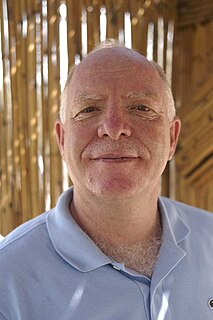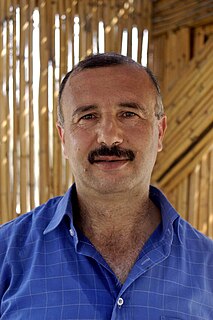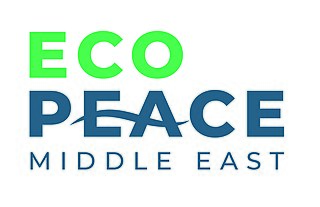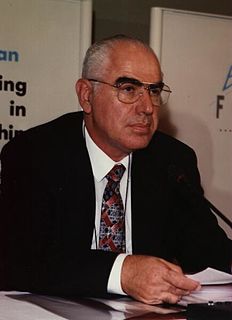
The Jordan River or River Jordan, also known as Nahr Al-Sharieat, is a 251-kilometre-long (156 mi) river in the Middle East that flows roughly north to south through the Sea of Galilee and on to the Dead Sea. Jordan and the Golan Heights border the river to the east, while the West Bank and Israel lie to its west. Both Jordan and the West Bank take their names from the river.

Arab–Israeli peace projects are projects to promote peace and understanding between the Arab League and Israel in different spheres. These are part of a broader attempt at a peace process between Palestinians and Israelis. Sponsors of such projects can be found both in Israel and Palestine.

The National Water Carrier of Israel is the largest water project in Israel, completed in 1964. Its main purpose is to transfer water from the Sea of Galilee in the north of the country to the highly populated center and arid south and to enable efficient use of water and regulation of the water supply in the country. Up to 72,000 cubic meters of water can flow through the carrier each hour, totalling 1.7 million cubic meters in a day.

The Red Sea–Dead Sea Conveyance (RSDSC), sometimes called the Two Seas Canal, was a planned pipeline to run from the coastal city of Aqaba by the Red Sea to the Lisan area in the Dead Sea. Its abandonment was reported in June 2021.

The Arava Institute for Environmental Studies (AIES) is an academic studies and research institute located at Kibbutz Ketura on the Israeli side of the Arava Valley. Under the motto that "nature knows no borders", AIES seeks to train future leaders of the Middle East in environmental issues so that they will be able to cooperate in solving regional environmental problems. The Arava is a sparsely populated desert valley that connects the Dead Sea region with the Red Sea, and is part of the Jordan Rift Valley. Between the Dead Sea and the cities of Eilat and Aqaba, the Arava forms the border between Israel and Jordan.

Water politics in the Middle East deals with control of the water resources of the Middle East, an arid region where issues of the use, supply, control, and allocation of water are of central economic importance. Politically contested watersheds include the Tigris–Euphrates river system which drains to the south-east through Iraq into the Persian Gulf, the Nile basin which drains northward through Egypt into the eastern Mediterranean Sea, and the Jordan River basin which flows into the Dead Sea, a land-locked and highly saline sea bordered by Jordan to the east and Israel to the west.

The Jordan Valley Unified Water Plan, commonly known as the "Johnston Plan", was a plan for the unified water resource development of the Jordan Valley. It was negotiated and developed by US ambassador Eric Johnston between 1953 and 1955, and based on an earlier plan commissioned by United Nations Relief and Works Agency for Palestine Refugees in the Near East (UNRWA). Modeled upon the Tennessee Valley Authority's engineered development plan, it was approved by technical water committees of all the regional riparian countries—Israel, Jordan, Lebanon and Syria. Though the plan was rejected by the Arab League, both Israel and Jordan undertook to abide by their allocations under the plan. The US provided funding for Israel's National Water Carrier after receiving assurances from Israel that it would continue to abide by the plan's allocations. Similar funding was provided for Jordan's East Ghor Main Canal project after similar assurances were obtained from Jordan.
Water politics in the Jordan River basin refers to political issues of water within the Jordan River drainage basin, including competing claims and water usage, and issues of riparian rights of surface water along transnational rivers, as well as the availability and usage of ground water. Water resources in the region are scarce, and these issues directly affect the five political subdivisions located within and bordering the basin, which were created since the collapse, during World War I, of the former single controlling entity, the Ottoman Empire. Because of the scarcity of water and a unique political context, issues of both supply and usage outside the physical limits of the basin have been included historically.
The "War over Water", also the Battle over Water, refers to a series of confrontations between Israel and its Arab neighbors from November 1964 to May 1967 over control of water sources in the Jordan River drainage basin.

Munqeth Mehyar serves as Chairman and Jordanian Director of EcoPeace Middle East. EcoPeace Middle East is a unique regional organization that brings together Jordanian, Palestinian and Israeli environmentalists to promote sustainable development and advance peace efforts in the Middle East. The organization has offices in Amman, Bethlehem and Tel Aviv, employs over 40 paid staff and actively involves hundreds of volunteers.

Nader Al-Khateeb is the General Director of the Water and Environmental Development Organization (WEDO), a non-profit Palestinian organization that promotes a number of environmental programs and projects centered on water quality control, water conservation, wastewater treatment and reuse, as well as solid waste management and recycling. He was also the Palestinian Director of EcoPeace Middle East. EcoPeace Middle East is a unique regional organization that brings together Jordanian, Palestinian and Israeli environmentalists to promote sustainable development and advance peace efforts in the Middle East. It has offices in Amman, Bethlehem and Tel Aviv, employs 40 paid staff and actively involves hundreds of volunteers.

EcoPeace Middle East, formerly Friends of the Earth Middle East (?–2014), is a regional environmental peacebuilding organization in the Middle East, bringing together Jordanians, Palestinians, and Israelis to create shared solutions for the most water-scarce region on the planet.
Heroes of the Environment is a list published in Time magazine. After the inaugural list of 2007, the next list was published in September 2008. The list contains 30 entries, individuals or groups that have contributed substantially to the preservation of environment, and is divided into four categories: Leaders & Visionaries, Moguls & Entrepreneurs, Activists and Scientists & Innovators.
Environmental peacebuilding examines and advocates environmental protection and cooperation as a factor in creating more peaceful relations. Peacebuilding is both the theory and practice of identifying the conditions that can lead to a sustainable peace between past, current or potential future adversaries. At the most basic level, warfare devastates ecosystems and the livelihoods of those who depend on natural resources, and the anarchy of conflict situations leads to the uncontrolled, destructive exploitation of natural resources. Preventing these impacts allows for an easier movement to a sustainable peace. From a more positive perspective, environmental cooperation can be one of the places where hostile parties can sustain a dialogue, and sustainable development is a prerequisite for a sustainable peace.
The Mount Zion Award is a biennial award by the Mount Zion Foundation, which has its seat at the Institute for Jewish-Christian Research (IJCF) at the University of Lucerne in Switzerland. The award is presented every other year close to October 28th. In 1986 the Mount Zion Foundation was created by the German Reverend Wilhelm Salberg (1925–1996), son of a Jewish father and a Christian mother. The Mount Zion Award is presented to persons of Jewish, Muslim or Christian faith, who have significantly contributed to the Jewish-Christian dialogue or to the understanding of the three Abrahamic religions, Judaism, Christianity and Islam, in Israel.

Refael (Rafi) Benvenisti, an Israeli economist, was the Co-Chairman of Israel Palestine Center for Research and Information (IPCRI) for many years and is now a shareholder of the organization. IPCRI is dedicated to the resolution of the Israeli-Palestinian conflict on the basis of the "two-states for two peoples" solution.

Alon Tal is a current member of the Knesset representing the Blue and White political party. He is a leading Israeli environmental activist and academic; founder of the Israel Union for Environmental Defense and the Arava Institute for Environmental Studies; and co-founder of Ecopeace: Friends of the Earth–Middle East, This Is My Earth, the Israel Forum for Demography, Environment and Society, Aytzim: Ecological Judaism, and the Green Movement. Tal was appointed chair of the department of Public Policy at Tel Aviv University in 2017.
The Valley of Peace initiative is an effort to promote economic cooperation between Israel, Jordan, and Palestine based around efforts and joint projects in the Arava/Arabah Valley, along which runs the southern portion of the Israel - Jordan border. It received the personal attention and support of Shimon Peres, President of Israel. The initiative involved ongoing joint efforts by regional leaders to launch joint new industrial and economic projects, which will create new local businesses and job growth, and promote ongoing cooperation.
The Environmental Provisions of Oslo II Accords

Israel–Palestine relations refers to the political, security, economical and other relations between the State of Israel and the State of Palestine. Israel and the PLO began to engage in the late 1980s and early 1990s in what became the Israeli–Palestinian peace process, culminated with the Oslo Accords in 1993. Shortly after, the Palestinian National Authority was established and during the next 6 years formed a network of economic and security connections with Israel, being referred to as a fully autonomous region with self-administration. In the year 2000, the relations severely deteriorated with the eruption of the Al-Aqsa Intifada – a rapid escalation of the Israeli–Palestinian conflict. The events calmed down in 2005, with reconciliation and cease fire. The situation became more complicated with the split of the Palestinian Authority in 2007, the violent split of Fatah and Hamas factions, and Hamas' takeover of the Gaza Strip. The Hamas takeover resulted in a complete rift between Israel and the Palestinian faction in the Gaza Strip, cancelling all relations except limited humanitarian supply.












